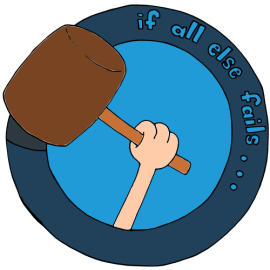Shakespeare famously wrote, “What is in a name? A rose by any other name would smell as sweet.” Juliet says this as she muses over how she and Romeo can be together because she’s a Capulet, he’s a Montague, their families are arch enemies, and as far as she’s concerned all that stands between them is his name. “So Romeo would, were he not Romeo call’d, retain that dear perfection which he owes without that title.” Simple, really: Romeo must just give up his name (I had all my days explaining to my kids in English class that she actually meant his family name, not his first name) and then they can be together. Ah, to be a naive teenager again, when the solutions to all of life’s problems were so very simple.
 Of course, people attach different meaning to names. For some, it’s merely a label, something that lets you know if people are talking to you. For others it’s a part or their identity, helping to define who they are. In several cultures a child’s name changes at a certain age, signifying the passage into adulthood, and on conversion to Islam, for example, it’s traditional to take a new name symbolising the end of the old life and the beginning of the new (this custom is also practised in certain Christian traditions, I think).
Of course, people attach different meaning to names. For some, it’s merely a label, something that lets you know if people are talking to you. For others it’s a part or their identity, helping to define who they are. In several cultures a child’s name changes at a certain age, signifying the passage into adulthood, and on conversion to Islam, for example, it’s traditional to take a new name symbolising the end of the old life and the beginning of the new (this custom is also practised in certain Christian traditions, I think).
And then there are people with more than one name. There’s their official name, by which they are registered and by which their mom still addresses them, and there’s the name by which they are known to the public. I’m talking about stage names, pseudonyms, noms de plume and pen-names (yes, I know the last two are the same thing). Yes, I’m also jumping on the bandwagon and throwing in my ten cents on the topic that has the interwebs, twitterverse and blogosphere abuzz this week: Robert Galbraith who became an overnight sensation when it came out he is really JK Rowling (for some reason I desperately want to end this sentence with the words, “…in drag.”)
Honestly I don’t know why everyone’s so excited about the whole affair. It’s not as if she’s the first author who’s done it. Take Mark Twain and George Orwell, two of the most famous authors of their respective centuries. The other thing they have in common is that neither of them exist, being known by their mothers and (hopefully) wives as Samuel Clemens and Eric Blair. In fact, here’s a list of ten famous authors who used pseudonyms. The list is by no means extensive and I’m sure if we did some digging we’d come up with quite a list of authors who’ve had dual identities.
Of more interest than the fact that Rowling did this, is the question why. Some have speculated that she wanted to see if a non-Harry Potter novel by her could be successful without her name attached, which is a reasonable assumption – it’s not as if she needs the money of another best-seller. Fellow-blogger Becky makes the important observation that the timing of the “leak” is a tad suspicious, falling as it does smack bang in the middle of the Northern Hemisphere’s summer vacation when everyone’s wondering what to read next to pass the time. It has also been pointed out that she now published under an unambiguously male name because apparently books by men sell better than books by women (as if she needs the help). I suppose only Ms Rowling and her publisher’s marketing department will ever know the truth.
Let’s consider other common reasons why authors use pseudonyms: In the case of Mr Clemens and Mr Blair (and others) they were already quite well-known as journalists and probably didn’t want to put their reputations on the line with works of fiction that might fail (and both their signature works were more than a little contentious). It is also fairly common for an author who is well-established within a certain genre and wants to try something different to do so under a different name, lest he estranges some of his existing fans. It could be that the author’s name is simply too common, especially if there are other famous people/authors with the same name (Matthew Wright can tell you a lot about this.)

Or maybe it’s simply a case of getting stuck with a crappy name, or one that’s not entirely suitable for the industry (Caleb Wilde, a funeral director, once featured a bunch of photos of funeral homes with very…unfortunate names on his blog) or the market you’re targeting.
Please note: there’s a second page. Click below.


What about Andrew Cookman? When I chose my pseudonym, it was easy. I just used my nickname and my dog’s name. But it took us a long time to name our dog.
LikeLike
Andrew Cookman can work. I’ll go google it to check there’s no convicted felons by that name 😉
LikeLike
Great post and thanks for the mention! I think you’ve summed up the topic really well.
Your comments on male writers especially interested me, I hadn’t considered the J.K. Rowling pseudonym from that angle yet. In certain genre’s I think this is much more prevalent: Fantasy, science fiction and crime/thriller/mystery – I tend to bunch those together. For some reason these seem to be genre’s where more male pseudonyms are used because it is an area where we expect writers to be male. It is quite odd! I can’t remember ever seeing a female writer in the crime/thriller section.
LikeLike
You’re forgetting about the greatest lady in crime fiction (and my birthday-pal), Agatha Christie. Then there’s Sue Grafton (haven’t read anything by her yet, though). But not really anyone current, no. In SF/Fantasy it’s changing, mostly due to a concerted effort by the SF and Fantasy Writers of America.
LikeLike
Ooohhhh no of course! Sorry Agatha, I didn’t mean to forget you! :s I’ve never heard of Sue Grafton but then I know very few authors of that genre by name. It’s an odd trend, one I hope we will progress past soon.
LikeLike
I only know of Sue Grafton because her titles are so characteristic. All her books are on a letter of the alphabet, like “M is for Murder”, and “K is for Killer” and so on. I think I started reading one once, but I put it down again very quickly. As mentioned before, crime’s not really my thing.
LikeLike
Oh, and you landed in my spam folder, so it’s still happening.
LikeLike
Ahh good I’m glad you found me! I was so annoyed when I saw the comment evaporate into the ether because I wasn’t sure if you would get it.
It’s so frustrating, I hope the company replies to my email soon. Apparently a huge number of people are having this problem but they’re dealing with it on a case by case basis. -_-. Very frustrating as it means I can’t really comment on any new blog because they may not find me.
LikeLike
I’m not sure why it was such a huge deal either. I would like to think she just wanted a little anonymity…after getting that big it would be nice to get back to that quiet triumph. Because she has already published a book outside of the Harry Potter universe and it did just fine. Perhaps she chose a male name because she wanted to become a completely different person for this story….like you said, I guess we’ll never know.
LikeLike
With HP her publisher apparently told her to publish as JK and not Joanne because novels by women don’t sell as well.
LikeLike
I think I might have read that somewhere. That’s sad and doesn’t really make much sense to me – good writing is good writing, no matter if it is a man or a woman!
LikeLike
Amen!
LikeLike
Hi – thanks for the shout-out! Apropos Rowling, I find it intriguing in a literary-historical sense that she chose a male name – as you say, likely for commercial reasons – because the same has applied before. Amandine Dupin (George Sand), Emily Bronte (Ellis Bell) and so on. I have a vague recollection of an episode of ‘Blackadder The Third’ sending the whole thing up, rather hilariously.
LikeLike
It’s sad, really, especially if one considers that according to some studies women read more than men which leads one to the conclusion that women consider men to be better writers. Of course the reality is much more complicated than that, but it makes one think.
LikeLike
I voted for Hermes Kokkieh.
LikeLike
Hermes…that’s a Greek god, isn’t it? Yeah, that could work. Now where did I leave my winged crocs…
LikeLike